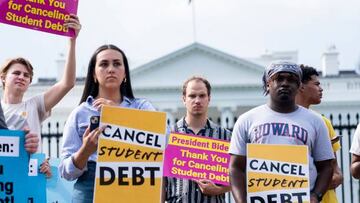Student loan forgiveness program temporarily blocked: How does this affect you if you have already applied?
One of President Biden’s flagship programs has been distrupted by a legal challenge from six Republican-led states.

A United States appeals court has imposed a temporary block on the student loan forgiveness plan introduced by President Biden. The Eighth Circuit Court of Appeals issued a stay on the program while an appeal from six Republican-led states is considered.
Biden had promised to cancel billions of dollars in federal student loan debt but some states had argued that the President had overstepped his authority by unilaterally declaring the measure without consent form Congress.
In a speech at Delaware University on Friday, Biden said that more than 22 million borrowers had already applied for the support. The administration was expected to start wiping up to $20,000 of student debt per borrower by mid-November.
For now the White House is unable to authorise a single cent of student loan forgiveness, pending the appeal court’s decision. However the court did request an expedited hearing to ensure that that case is concluded swiftly.
“We will continue to move full speed ahead in our preparations in compliance with this order,” said White House Press Secretary Karine Jean-Pierre in a statement. “And, the Administration will continue to fight Republican officials suing to block our efforts to provide relief to working families.”
Who is trying to block the student loan forgiveness plan?
On Thursday a district court judge in St Louis ruled that a joint effort by six GOP-led states to block the introduction of the student loan forgiveness plan had failed to establish standing. Attorneys for the states of Arkansas, Kansas, Iowa, Missouri, Nebraska and South Carolina argue that Biden is not able to authorise such widespread student loan forgiveness.
However that decision was followed swiftly by an appeal, which the court has agreed to hear before the White House can continue with the forgiveness program. The lawsuit is being led by Nebraska Attorney General Doug Peterson, a Republican, who questioned the financial implications of the measure.
Related news
“It’s very important that the legal issues involving presidential power be analysed by the court before transferring over $400 billion in debt to American taxpayers,” Peterson said.
It is thought that the administration will be able to overcome whatever legal hurdles the six states place in its path, but time is ticking to get the forgiveness approved.
Alongside the forgiveness measures, Biden announced a final extension to the student loan moratorium that has been in place since the start of the pandemic. The moratorium on student loan repayments and interest is set to end on 1 January 2023.
If the Biden administration has not enacted the forgiveness package by then, some borrowers who are expecting to have the remainder of the outstanding balance wiped off would have to begin making repayments again.






